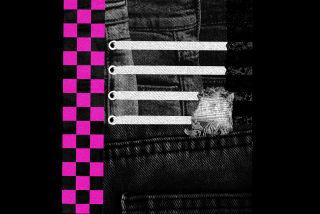‘Kick a Ginger Day’ leaves a bitter lesson
Courtesy is a big deal at A.E. Wright Middle School in Calabasas.
Caring was the recent “trait of the month,” the focus of the school’s website, and the theme of an “anti-bullying” assembly. Even the sign alongside the carpool loop reminds parents to “Please Be Patient and Drive Slowly. Courtesy Is Always Expected.”
That’s why the fallout from “Kick a Ginger Day” hit the campus like a punch in the gut this week.
Kids were invited via a widely circulated Facebook message to “kick a ginger” -- a redhead -- on Nov. 20. At Wright, the kicking, shoving and taunting by small groups of marauding boys left several girls in tears, one boy with his arm in a sling, and a trio of 12- and 13-year-olds arrested on charges of assault and cyber-bullying.
It was “disappointing,” said Principal Kimmarie Taylor, whose Nov. 2 “Note From the Principal” was devoted to the damaging effects of “unkind words, actions or deeds.”
“I don’t think this means we failed,” she said when I visited the campus this week. “They get that bullying is wrong. But they don’t know that’s what they did.”
::
It seems like a no-brainer to me. You target random classmates, ambush them, taunt them, rough them up. . . . If that’s not bullying, what is?
Public opinion has been all over the map: It’s a hate crime, with redheads as victims instead of gays or blacks. It’s an innocent prank that went too far. It’s the fault of mean kids and inattentive parents. It’s the influence of crude television shows and cruel online sites.
Ask the educators who run the middle school campus, though, and they’ll tell you it’s a predictable bump on the road from childhood to adolescence.
Middle-schoolers “make bad choices because they’re not thinking beyond the moment,” said Principal Taylor. “They didn’t set out to hurt someone. . . . They think saying ‘I’m sorry,’ or ‘We’re friends,’ or ‘I was just joking’ excuses the behavior. And it doesn’t.”
Like the instant-message insult followed by lol. Or the happy face after a cutting remark.
Still, anyone who has witnessed good-natured, even-tempered sixth-graders morph into secretive, surly, volcanic teenagers knows it can’t be entirely their fault.
Their developing prefrontal cortex makes them impulsive, hypersensitive, unprepared to weigh risks and rewards. In fact, the mere presence of a teenager’s friends can unhinge the brain and lead to lousy choices.
In a recent brain-imaging experiment by Temple University psychologist Laurence Steinberg, teenagers who brought their friends along to the lab for the experiment took twice as many risks as those who were alone when they were administered computerized risk-taking tests.
That thought is scary enough when your kid’s social circle includes a few girls who drink or boys who drive too fast. You worry that they might set group standards.
But today your teenager’s peer group includes the 700 “friends” on her Facebook list, and all but a few of them are strangers to you.
As plans like “Kick a Ginger Day” float from friend to friend through cyberspace, they gain momentum and social weight. “It validates that this must be an OK thing to do,” explained Taylor. “It becomes the norm, like everybody’s doing it.”
::
It has been a tough few months for Calabasas. The suburb, between Malibu and the San Fernando Valley, has long been known for good schools and gated communities. These days it’s the headliner locale of the “bling ring” band of celebrity thieves and ginger-bashing middle-school kids.
But A.E. Wright wasn’t the only place where gingers got taunted, swarmed and kicked. Google the “kick a ginger” phrase and you can tap into a national thread, featuring the fears, anger and “bring it on” bravado of years’ worth of red-haired victims.
“Kick a ginger” is the mean-spirited iteration of the practice of singling people out. Most involve cyber-invitations to hug, not punish -- hug a short person, a Jew, a lesbian. It seem like harmless inbox fodder. But that strikes me as a cynical way of labeling students to focus on differences instead of shared status.
The ginger episode stirred people up because it put a face on our fears about the under-the-radar world inhabited by our kids. “It’s the cyber phenomenon that’s so scary for parents,” said Mary Schillinger, the Las Virgenes Unified School District’s deputy superintendent.
And while it spread among kids as an impersonal online trend, “Kick a Ginger Day” turned into a real-life lesson that put a face on bullying for them.
“It seemed funny that morning,” seventh-grader Annie Reznik said of the light-hearted joshing among friends on campus. “Like, OK, people are doing this for entertainment. They don’t see it as something bad.”
Some students at A.E. Wright told me they just played along -- tapping red-haired buddies with their toes -- because they wanted to share in the joke.
But when Annie saw a little red-haired girl crying, the joke turned sour.
The redhead had been swarmed by a bunch of strangers.
“They surrounded her and kicked her. . . . She didn’t know them. And they were laughing,” Annie said.
“And I thought, ‘Oh, that’s horrible.’ You could tell how bad she felt.”






